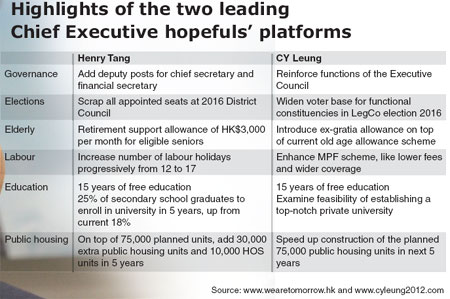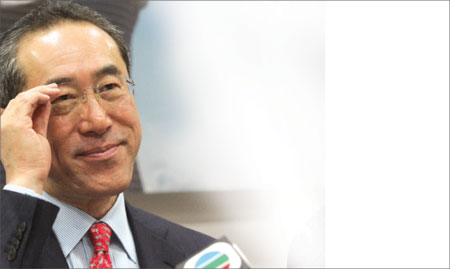CE hopeful promises to maintain low tax rate
Updated: 2012-02-15 08:33
By Kahon Chan(HK Edition)
|
|||||||||
|
Photo Provided to China Daily |

Pledge comes despite election platform adding HK$20b recurrent expenses
Henry Tang sealed his election platform on Tuesday, underscoring it with the motto "I will do what I promise". The Chief Executive hopeful set out more ideas about governance, labor and political progress. The platform left open many questions, Tang said, to keep his platform "neat" and "easy to read".
Tang's plan is similar to one put forward by his principal opponent, Leung Chun-ying, to create a culture bureau. Tang, however, said he would appoint two new deputies under the chief secretary and financial secretary. Leung had said he would "consider" creating such posts.
Having held the offices of chief secretary and financial secretary before heading onto the campaign trail, Tang said the two new officials would be required to handle the overwhelming workload to coordinate interdepartmental tasks. The existing undersecretaries will stay, but the bureaus will be given autonomy to assign political assistants or policy advisers based on their needs.
The scope of responsibility between the bureaus could be reshuffled. Tang said he particularly hopes to restore the title of commerce, industry and technology bureau because he has "emotional ties" with the bureau he once ran.
Tang maintained that his administration will keep tax rates low, in spite of additional recurring annual expenses of up to HK$20 billion required to pay for his new measures. Those include an elderly allowance of HK$3000 and construction of 40,000 units of subsidized housing within in five years.
"A financial reserve of HK$600 billion is enough. We don't need to save more food for a famine." Tang said the healthy budget forecast for next five years is a good reason to spend more.
Tang, who had something for the working man, said the number of annual holidays for blue collar workers would increase from 12 to 17. Public bodies will introduce paternity leave for fathers.
Standard working hours were not written into the platform, but Tang promised at the press briefing that he will establish a committee similar to the one that helped to set up the minimum wage. "I think legislation will eventually be necessary," he said. "But it is only feasible when the employers, labor and government reach a consensus."
Pan Pey-chyou, the legislative councilor from the Hong Kong Federation of Trade Unions, called Tang an acceptable candidate, but said the union will not rush to endorse him. "CY Leung has yet to respond, but I think it is a matter of time." Pan said.
Based upon the guidelines laid out by the National People's Congress Standing Committee (NPCSC) in 2007, both candidates vowed to bring together public views on how to conduct the LegCo election in 2016 and the first election in which universal suffrage will choose the Chief Executive in 2017. Neither candidate has shown much willingness to express his own views.
Tang explained he did not want to make arbitrary judgments. "Not only is there public opinion, but also opinion from the NPCSC. I cannot answer these questions on my own."
CY Leung had proposed to replace company voters with individual voters for the 2016 LegCo election and to launch debate on the LegCo election in 2020. Tang, on the other hand, gave no preference on how to reform the constituencies. He agrees only that the electors' profiles of existing functional constituencies contradicted the rule of universality and equality.
Tang affirmed Hong Kong's constitutional duty on local legislation for national security, but he found no consensus in the community and no urgency to comply with the requirement of Basic Law Article 23.
kahon@chinadailyhk.com
China Daily
(HK Edition 02/15/2012 page1)
